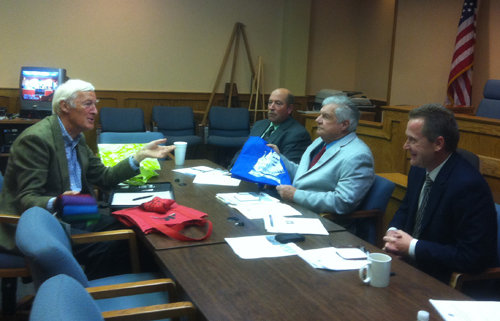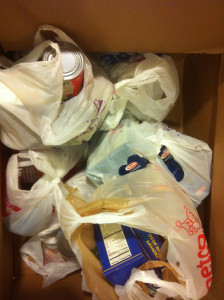Plastic bag ban has split support in town hall

The Town Board appears split on a plastic shopping bag ban in Riverhead Town — last pitched to the board in May of this year — which was discussed in town hall last Thursday, and could be subject to an inter-municipal agreement with other towns and villages in the area.
Dieter Von Lehsten, the co-chair of Southampton Town’s Sustainability Committee, spoke at the work session to try and convince Riverhead to ban single use plastic shopping bags, something Southampton Town is considering and Southampton Village and East Hampton Village have done.
In May, members of the East End Supervisor’s Association said that they were aiming to pass an East End-wide plastic bag ban by Earth Day of 2015. Mr. Von Lehsten has since been making the rounds to East End towns and villages, trying to convince them to enact the ban.
Get the news to come to you: like us on Facebook and follow us on Twitter.
Riverhead Councilman John Dunleavy and Mr. Wooten said they both support the plastic bag ban, while Councilwoman Jodi Giglio said she wants to have a public hearing before deciding.
“Plastic bags are hurting our ecology,” Mr. Dunleavy said. “They don’t disintegrate.”
He said three large box stores in town — BJ’s Warehouse, Costco and Aldi — now ban plastic bags.
Riverhead Supervisor Sean Walter said that he’s already getting calls from the New York State Supermarket Retailers Association asking whether Riverhead plans to ban plastic shopping bags.
The supervisor believes there will be a lawsuit if the bag ban is enacted.
Mr. Von Lehsten said there has been no lawsuits filed against Southampton Village and East Hampton Village, which both adopted the ban in 2011.
“They don’t have the level of retailers that Riverhead does,” Mr. Walter said, alluding to the large national chain stores on Route 58. “The lawsuit is going to happen.”
He suggested the five East End towns start a defense fund to pay the cost of any legal fees associated with a lawsuit challenging the plastic bags.
He feels the ban should be done on a county level, and not by individual towns.
“The single largest consumer item globally are single used plastic bags,” Mr. Von Lehsten said, quoting from various scientific studies. “We are using, by the lowest estimates, 500 billion to one trillion bags annually. That is a lot of plastic bags. And considering that these things never totally disintegrate, it is a gigantic environmental and health problem for us.”
He said the country goes through over 100 billion bags annually, and Southampton Town, uses 23 million bags annually.
“Only four to seven percent are recycled, and the rest goes into landfills or the ocean,” he said.

One large area in the Pacific has an island of plastics caught in the center of it that is twice the size of Texas, Mr. Von Lehsten said.
He said both plastic bags and paper bags should be banned and replaced with reusable bags.
Councilman George Gabrielsen said that studies from several universities have found that eight percent of the reusable bags that were randomly sampled had e-coli bacteria in them, because people don’t wash them after carrying things like meat products in them.
Also by Tim Gannon:
• Two more years needed for Riverhead’s sewer work
• Town considers outside partners to market EPCAL land
• Planning Board still waiting on work from Route 58 developer
He and Mr. Walter also said that plastic bags are being reused as well. Mr. Gabrielsen said plastic produce bags are used extensively by farm stands, and Mr. Walter said he reuses plastic shopping bags to line his garbage at home.
The produce bags are not included in the ban proposed by Southampton Town, nor are large trash bags.
“I absolutely find this a global issue that goes far beyond us,” Mr. Wooten said. “Something of this global magnitude, isn’t this something the federal government should be looking at as well?”
“It’s a bottom-up movement,” said Mr. Von Lehsten, who grew up in Europe and Australia and is a retired managing and marketing consultant.
In California — which recently banned plastic shopping bags statewide, the movement started at the town level — where 97 municipalities pressured the state to enact the ban. Trying to start at the state or federal level won’t work, he said.
Globally, there 78 countries that have banned plastic shopping bags, he added. In New York State, the City of Rye, the Town of Mamaroneck and the Village of Larchmont have banned plastic shopping bans and have not been sued, he said, and now the City of New York is considering it.
“If you want to make this a regional ban, then the municipalities have to come together with an inter-municipal agreement where we’re all going to contribute to a defense fund,” Mr. Walter said. If Mr. Von Lehsten could deliver that, the supervisor said he would vote for a public hearing on the plastic bag ban, although he made no commitments to actually support the ban.
The towns would pay proportion to population, and if no one gets sued by the time the statue of limitations, by which a lawsuit could be filed, expires, the money would be given back.
“It’s an interesting proposition,” Mr. Von Lehsten said.
Mr. Walter said the town needs to have a legal analysis from the town attorney’s office before it can hold a hearing.
The Southampton Town Board on Tuesday is scheduled to vote to schedule a Nov. 25 public hearing on a proposal to bag single use plastic shopping bags from being used for “retail checkout bags,” which it defines as a “carryout bag that is provided to a customer at the point of sale.”
The term “checkout bag” does not include plastic produce bags or plastic bags measuring 28 inches by 36 inches or larger in size, which are the largest garbage bags, the proposal states.

